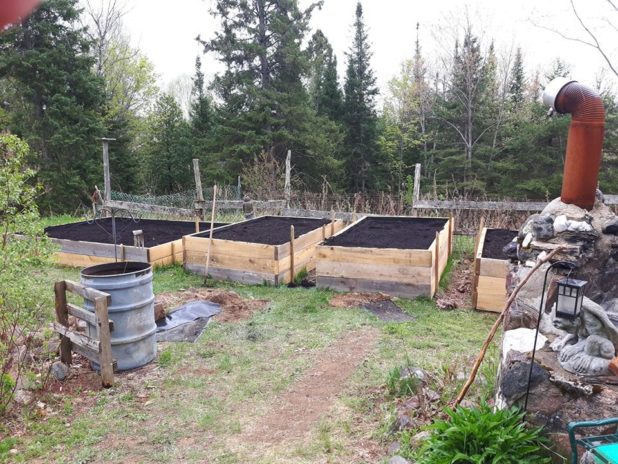General News
Spring is here, time to garden
April 7, 2020

April 7, 2020
By Kristena Schutt-Moore
The general rule of the green thumb is to start garden seeds indoors roughly six weeks before the frost leaves the ground in the gardening area. This means that now is the perfect time to start planning that dream garden. Especially with the extra time that social and self-isolation offers.
Planning a garden can be a fun experience, full of excitement, anticipation, and creativity and it can be done as a solo project or the whole family can get involved. To start, do a bit of research about what kinds of plants can grow in the area and its soil type. The nearest library or horticultural society is a great place to start researching and many have made their information available online.
Many gardeners swear that first thing is to start with, is soil. Dorothy Gerrow recommends getting organic potting soil from a local farm supply store and reusing items from the recycling to plant your starter plants in. She finds that setting trays at the windows on racks gives the best growing effect. “I did all my indoor seeds last week and they are starting to sprout.”
Recycling items for starter seeds is a great way to keep things affordable and to lower the amount of items that are headed to the landfill. Marie Filipe says that different materials work better than others. One of the most popular starter containers is old egg cartons but Filipe says that they can cause mold issues with plants that need constant moisture. Instead, she uses old water bottles, milk, and cream cartons that she has saved over the winter months for gardening. She moved to the Bancroft area in 2017 and says that she has noticed that it is difficult to start a garden from seeds, but it is possible. Her best advice is to “Stay determined!”
The Bancroft area is designated as Planting Zone 4a. This means that Mother Nature rarely follows a schedule here and temperatures and weather activities can change frequently and with ease. Spring could mean that it is warm and sunny one minute and the next it’s overcast and freezing rain is falling. So it is important to watch the weather and find out what types of fruits and vegetables grow in the area.
Different types of squashes, lettuces, carrots, onions, tomatoes and trees such as apples grow great in the North Hastings area. However, root vegetables get a slower start due to the shorter growing season and do not take to transplanting well. So, if root vegetables are a goal, the options are to place them in a large container so that they are not badly disturbed during transplanting or wait until the frost has left completely and start them outside.
For a new gardener, organization is key. Dianne Winmill suggests keeping tape and a marker handy, “Label everything and write everything down in a book!” A book is also a great planning tool as a way to remember what worked and what didn’t from year to year. This tip can help even the most experienced of gardeners get the best results repeatedly.
Once it’s time to plant outside there are several ways to grow the desired food. Each fruit or vegetable has its preferred place to grow. For example carrots prefer a loose, drier soil and being close to its friends, while cucumber would prefer richer earth and to be by itself so it can spread out. An old barrel works great for this.
In Zone 4a placing a garden can mean a mix of guess work and hard work. Alexandra Marie offers this advice, “If you can make your rows go east-west, there’s an advantage of planning for sun and shade. Plant tallest things like pole beans, cucumbers, tomato, peas on a trellis in the northern-most beds. Plants should get shorter as you move southward to prevent shading things out.”
There are a variety of garden bed types that help organize plant type and available garden space. One of the most popular are raised beds. These come in all shapes and sizes and can also be made from leftover lumber and supplies at home. These garden beds are handy for those with mobility issues and help combat the acidic soil North Hastings is known for as they can be filled with the desired materials. Locally the most popular and famous raised beds are the ones in Riverside Park that are managed by Harvest The North and the North Hastings Community Trust.
Pat Stephenson explains why raised beds or growing boxes are so popular for seniors, “I have tried a selection of growing boxes over the past few years beginning with starting some seeds inside first. I like to start greens that can handle cold-like collards, chard, kale, and spinach. Aiming at getting two plantings a growing season, one at the beginning and one at the end of the season. As a single senior, I find the greens, lightly steamed and rolled into cigar shapes for the freezer are an easy slice and throw into whatever you are cooking over the winter, giving that green boost. I am on a learning curve with an ongoing goal of seeing if a single senior can grow enough produce, relatively easily using grow boxes, to supplement winter food needs.”
No matter what the type of garden you are growing, getting nutrients to the plants is one of the most important steps. Marie manages her own hobby farm complete with chickens and she recommends that once in the ground plants get watered with what she calls “compost tea,” which is created by steeping compost in water for a week. This gives plants the organic nutrients they need with regular watering. Collecting compost is a whole other challenge for gardeners, but can be easily done with the right information and is great for any garden. Marie might also plan on building a pond on her farm so that the process of water storage and making compost tea becomes easy. But for that, she would require Pond liner and other such building materials. Moreover, she will also have to find the manpower who would help her build the pond.
Gardening on a whole can be as challenging as it can be rewarding. It’s a chance to bring out a person’s creativity, keep busy yourself or spend time with loved ones while bringing the fresh taste of the garden to the table. Plus any extra produce can help a community by being donated to local organizations and programs.















